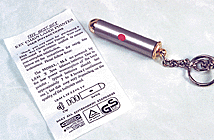Avoid direct eye exposure to a beam of laser light, the Consumer Council cautioned today. It may be potentially damaging to your eyes.
A laser product such as a laser pointer is commonly used to project a spot on the screen showing slides or transparencies during a demonstration. Such normal usage should not present any eye hazard.
An International Electrotechnical Commission (IEC) standard requires that a laser product that falls into the category Class 3A be labelled with adequate warning of its potential hazard to the eye.
It should warn its users not to stare straight into the beam or view directly with an optical instrument such as a telescope or binoculars.
A powerful laser beam from any laser product if directed to the eye is potentially dangerous. The laser beam may be brought to a focus on the retina and results in heat absorption. Depending on the exposure time and the power of the laser, the damage may lead to visual decrement.
Acting on a complaint, the Electrical and Mechanical Services Department has tested apiece of product identified as "Max key chain laser pointer".

This key chain laser pointer, however, was found to be without any safety warning - either on the product or in the user instructions.
The product is available for purchase in 2 colours, gold and silver, at a price of around $250.
The test has revealed that the key chain laser pointer is capable of emitting a continuous red beam of laser at a power output of 2.3 mW (the gold model) and 3.0 mW (the silver model) respectively. It is therefore a Class 3A laser product requiring to carry a safety warning.
Incidental exposure of visible laser beam from Class 3A is normally harmless to the eye because the natural body response such as the blink reflex will make the laser exposure time very brief. However, prolonged exposure e.g. staring at the laser beam to check whether the battery is weak or not may cause substantial damage to the eye and this must be avoided.
As the product is battery operated, it falls outside the scope of the Electricity Ordinance. The case has been referred to the Customs and Excise Department for investigation under the Consumer Goods Safety Ordinance. A Prohibition Notice has already been issued prohibiting the supply of the product. It is of utmost importance that users be alerted to the hazard through proper warning.
The Council is particularly concerned about the proper use of this type of product. As such product is freely available in the market, the Council is concerned that if it falls into the wrong hands and in particular into the hands of children, the abuse in use may lead to serious consequences. They may stare into the laser beam or point the beam at other's eyes.
The Council is therefore of the view that the Government and the manufacturers should look into the need to enhance awareness of the hazard of such a product.

A Consumer Council survey has revealed considerable diverse experiences with regard to the quality of service of residential property management companies.
On the one hand, almost 1 in every 4 (23%) respondents - Incorporated Owners or Mutual Aid Committees - expressed dissatisfaction with the service of their existing property management companies.
Their dissatisfaction was related mainly to the quality of the staff (lacking professional knowledge, low efficiency and high turnover, etc.), financial control (lacking transparency, excessive repair and maintenance costs, high management fees, etc.)and security service (poor alertness and adaptability of security guards, frequency of patrolling, etc.).
On the other hand, more than half (60%) of the respondents reported satisfaction and had no intention of replacing their existing property management companies. Their satisfaction stemmed largely from the mutual trust and co-operation they have developed with the companies that are able to provide professional opinion, diligent and efficient staff, sound financial control and reasonable management fee, etc.
The remainder 17% replied no comment.
The findings were based on a questionnaire survey of 469 respondents who are either Incorporated Owners or Mutual Aid Committees in use of the service of property management companies for their residential buildings.
Based on their responses, the survey evaluated the performance of 15 companies which have received a sufficient number of returns for analysis purposes in the areas of (1) quality of management staff, (2) financial management, (3) repair and maintenance, (4) security and fire prevention, and (5) sanitary conditions.
According to the survey, slightly more than half (52%) of the respondents considered the monthly management fee charged to be "reasonable" or "very reasonable". 13% deemed otherwise and opined that the fee should be reduced by an average of 23%.
On the manager's remuneration, only 42% of the respondents thought the amount charged was "reasonable" or "very reasonable". 17% deemed otherwise suggesting that it should be 4% lower than the existing level of charges.
Full findings of the survey were published today in the June issue of "CHOICE". It provides useful reference information to anyone contemplating engaging the service of property management companies which number at present between 400and 500, and helps you to compare how your existing management company fares with the others.

Air-conditioners can run up your electricity bill substantially in the summer months. So it pays to choose an energy efficient model.
The result is beneficial to both you and the environment as it reduces your monthly spending on electricity and helps conserve precious energy resources of the world.
A Consumer Council test on 16 models of air-conditioners of a claimed cooling capacity of about 5 kW or 2 horse power - the biggest units tested by the Council so far - has confirmed that substantial savings on electricity could indeed be derived between the most and the worst energy efficient models.
According to the test, it was estimated that the annual running cost of electricity ranged from $2,066 (the most energy saving) to $2,968 (the worst), a difference of 30%! Assuming a lifetime of 5 to 8 years, the accumulated savings are enough to buy a new air-conditioner.
On cooling capacity, most models included in this test were less than the claimed value with discrepancies ranging from 3% to 18%.
For 5 kW (2 horse power) models, it is estimated that they can cool a space from 17 to26 square metres. A formula on how to estimate the size of air-conditioner one needs for cooling purpose is provided in the report.
The test also examined the widespread problem of dripping of condensate water from air-conditioners. It was found that, at 80% relative humidity, all but 2 models would produce condensate water dripping on the outdoor side, if no drain hose is fitted.
Consumers are therefore advised to install a drain hose to 5 kW window units as the large amount of condensate water will not be evaporated fast enough under the extremely humid ambient condition in Hong Kong during summer.
Also for the first time, the Council has included in the 16 air-conditioner test samples, 3 models that combine also the "Reverse Cycle" or "Heat Pump" space heating function. These models are generally higher priced ($6,500 to $7,500) than the cooling only air-conditioners ($5,000-$6,000).
The report observed that "Reverse Cycle" or "Heat Pump" models are more energy efficient than conventional space heaters. It was found that they cost $207 to$430 while a conventional 2 kW space heater costs $540 to operate in winter (assuming 30days x 10 hours per day).
Other advantages are: they have higher heating capacity thus able to heat a larger space more quickly; they do not occupy floor space in winter; and they do not occupy storage space in summer.
But they are not without their disadvantages: they cost 15% to 20% more to buy; they are noisier; the outdoor heat exchangers would ice-up during extreme cold days reducing the energy saving; and when that happens the heat pumps would automatically go into the defrost cycle and the heating would stop for minutes during which time, in severe cold weather, older or weaker persons might need to turn on a backup heater.
The report also noted the Government's voluntary Energy Efficiency Labelling Scheme (EELS) which was met at first with a rather cool reception from manufacturers. But since a seminar organised jointly by the Consumer Council and the United Nations ESCAP in March, at least 7 room cooler models from 3 manufacturers have applied to join the scheme and are issued the EELS energy labels for information of consumers.
Further, the report referred to the accidental falls of room air-conditioners from high rise buildings reported every now and then. The latest accident occurred on Thursday (June12) in which a window unit fell off onto a busy street in Kowloon.
Owners of air-conditioners are urged to employ qualified and experienced engineers to install their air-conditioners. They also have the responsibility to inspect the installation regularly for signs of rust or deterioration.
The Council is working with the Housing Department to publicize their regulations on the installation of room air-conditioners. An article with the department’s recommendations will be published in the next (July) issue of 'CHOICE'.
At present there is only one Ordinance regulating building structures - the Building Ordinance - yet there is no provisions on the installation of domestic room air-conditioners which are not supported by a frame structure.
In 1988, on the advice of the Building Department air-conditioner hoods or platforms were designed into new buildings. But for older buildings, the Building Department is promoting a Building Safety Inspection Scheme to attend the problem of hazardous structures like room air-conditioners, laundry drying racks and pot plant racks.
Members of the public may contact the department's Building Surveyor (Public Relations)on telephone number 2626 1234 for advice or dial the hotline 2626 1271 to file complaints on dangerous structures.
Meanwhile, the Consumer Council will operate its complaints and advice service throughout the forthcoming 5-day public holidays.
The Council's consumer advice centre at Tsimshatsui, in the heart of Kowloon, will stay open during the hours from 12:00 noon to 5:00p.m. daily between June 28 (Saturday)and July 2 (Wednesday).
The arrangement is to facilitate consumers, both local and tourists, who may be in need of such service during the long period of public holidays.
They are welcome to visit the centre at room 126, Tung Ying Building, 100 Nathan Road, or call the centre's telephone number on 2721 1580 for consumer complaints or advice.



